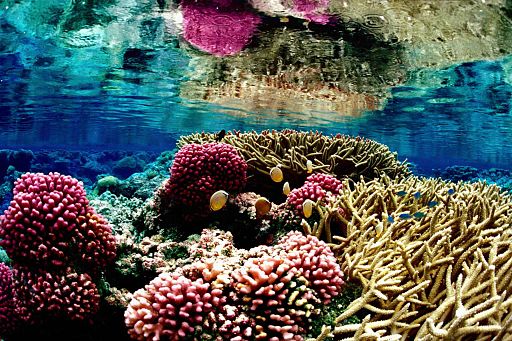Measuring the age of corals can provide insights for paleoclimatology studies. For deep sea corals, a combination of radiocarbon dating and uranium-thorium dating can be used. The carbon-14 date represents the age of the coral and the water, whereas the uranium-thorium date reflects the coral itself. This can provide information on past deep sea circulation rates.
 Coral polyps are small organisms with a calcium carbonate base skeleton. As these coral polyps multiply, they form the recognizable coral reef structures. Corals themselves are colorless, but the algae they provide a home to give the characteristic colors seen in the reefs.
Coral polyps are small organisms with a calcium carbonate base skeleton. As these coral polyps multiply, they form the recognizable coral reef structures. Corals themselves are colorless, but the algae they provide a home to give the characteristic colors seen in the reefs.
Isotopic studies on corals, using δ18O, can reveal variations in ocean temperatures. The Marine Isotope Stages (MIS) characterize warmer and cooler periods that the Earth has undergone based on δ18O values. The 16O isotope evaporates more easily than 18O, so in cooler periods where the evaporated oxygen is stored in ice or snow, the oceans are enriched in 18O.
Radiocarbon dating and isotopic analysis of corals is useful for paleoclimatology studies and for understanding coral growth during different climate periods.
ISO 17025-accredited Beta Analytic accepts coral samples for radiocarbon dating. For AMS dating, the lab recommends sample size of 5-100 milligrams. The δ13C and δ18O measurements by isotope ratio mass spectrometer (IRMS) are included at no additional cost when submitting coral samples for radiocarbon dating.
The pretreatments applied will reduce the sample size by varying amounts depending on the degree of preservation and amount of sample sent. The minimum quantity required for routine AMS analysis is as little as 3 milligrams of coral after pretreatment. Sending 50-100 milligrams typically allows the laboratory to perform sufficient cleaning to ensure that only primary carbonate is left for dating. Larger sample sizes also allow for repeat analyses if needed to confirm unexpected results, or for reasons of Quality Control. You can contact the lab to discuss pretreatment options or request that a Beta Account Manager contacts you after pretreatment before commencing with the AMS dating.
Radiocarbon dating results are reported within 14 business days (standard AMS dating service) and both past and pending results can be accessed online 24/7. Fees are inclusive of quality assurance reports, calendar calibration when applicable and unlimited technical support.
For corals and other carbonates, Beta Analytic also offers δ13C and δ18O stable isotope analysis on a standalone basis. The interpretation of stable isotope values lies with the submitter.
The Miami-based lab also provides the following analyses:
– δ13C for cremated bones or organics
– δ13C and δ15N for non-cremated bones
– δ13C, δ18O and δD measurements for water
For samples that do not require lab pretreatment, stable isotope analysis results are reported in 7 business days. For samples that do require lab pretreatment, results are reported in 14 business days. Please contact the lab for sample sizes and prices.
References:
Cobb, K., Coral records of natural and anthropogenic climate change. (accessed May 2018)
Hirst, K. K., Marine Isotope Stages (MIS) – Tracing the Climate of Our World. (accessed May 2018)
National Geographic, Corals. (accessed May 2018)
National Oceanic and Atmospheric Administration (NOAA), updated 2017, Are corals plants or animals? (accessed May 2018).
Photo credit: U.S. Fish and Wildlife Service via Wikimedia Commons
This entry was posted on Friday, June 15th, 2018 and is filed under Radiocarbon Dating .